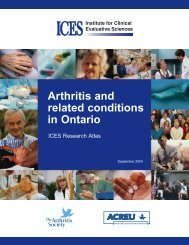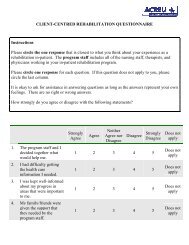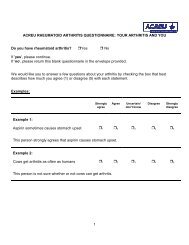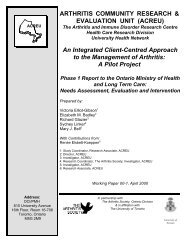Client-Centred Rehabilitation - Arthritis Community Research ...
Client-Centred Rehabilitation - Arthritis Community Research ...
Client-Centred Rehabilitation - Arthritis Community Research ...
Create successful ePaper yourself
Turn your PDF publications into a flip-book with our unique Google optimized e-Paper software.
34<br />
“.... But in terms of profession,<br />
having a friend who was a lawyer as<br />
part of my physio group who was<br />
sort of a peer supporter, a mentor<br />
was terribly important and he sort of<br />
...to a large extent... one of the things<br />
that a client should be urged to do is<br />
find people who are going to<br />
graduate before they do with similar<br />
abilities and interest and hook onto<br />
that person, you know...what kind of<br />
clothes you don’t buy, what type of<br />
food you can eat by yourself when<br />
you’re out.” SCI #2<br />
“ I didn’t think we didn’t talk about<br />
a few things in these twelve weeks<br />
and one the things that I think we<br />
should have done much much more<br />
of is share our experiences.” COPD<br />
#1<br />
All of the participants talked about receiving<br />
peer support during inpatient admissions.<br />
However, the continuation of this peer<br />
support in the community varied by the<br />
person’s condition. Some clients,<br />
particularly those with <strong>Arthritis</strong> and ABI,<br />
reported receiving support from community<br />
organizations specializing in their<br />
conditions. Specifically, clients talked about<br />
how programs offered by community<br />
organizations helped them cope with their<br />
condition. For example, the <strong>Arthritis</strong> Self<br />
Management Program (ASMP) was<br />
identified by all of the participants with<br />
arthritis as a client-centred, self-directed<br />
program that provided them with<br />
considerable support in the community.<br />
“The <strong>Arthritis</strong> Self-management<br />
Program. If you call The <strong>Arthritis</strong><br />
Society and ask them about it. I think<br />
it’s a full week course. It’s not a<br />
gripe session. You actually learn a<br />
lot of the disease, how to get through<br />
it and what else is out there for you.<br />
They give you an idea how to<br />
manage our pain, how to manage the<br />
emotions that you go through.<br />
Because they all know about it. It’s a<br />
lot of like this – talking back and<br />
forth and learning about this.” ARTH<br />
#4<br />
Staff can also be important sources of<br />
emotional support for clients. Such<br />
emotional support took the form of staff<br />
members offering advice, encouragement<br />
and direction. <strong>Client</strong>s talked about the<br />
importance of clinicians being positive,<br />
professional and goal-oriented.<br />
<strong>Client</strong>s referred to receiving help from their<br />
general practitioners, specialists or<br />
therapists. One client described the<br />
encouragement that he received from a<br />
physiotherapist:<br />
“One time, and it was the only one<br />
time, that (CARS) The <strong>Arthritis</strong><br />
Society sent a physio to my home. I<br />
found her advice that she was giving<br />
me to be very positive and uplifting,<br />
that there was hope down the road<br />
and she talked a little bit about<br />
medications and guided me as<br />
towards the things that I should ask<br />
about. That was uplifting as well.”<br />
HIP KNEE<br />
Difficulties arose when the clients felt that<br />
they were not being treated with respect or<br />
dignity. An individual in the Spinal Cord<br />
Injury group expressed how the institutional<br />
setting made it difficult for individuals to<br />
hold onto their dignity:<br />
“Just about any sense of personal<br />
dignity or being undressed or having<br />
a bowel movement in a crowded<br />
washroom with three or four other








